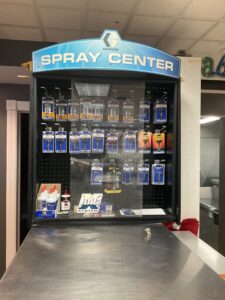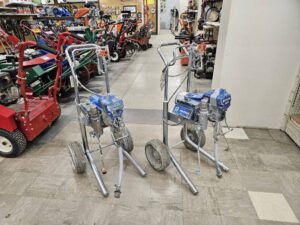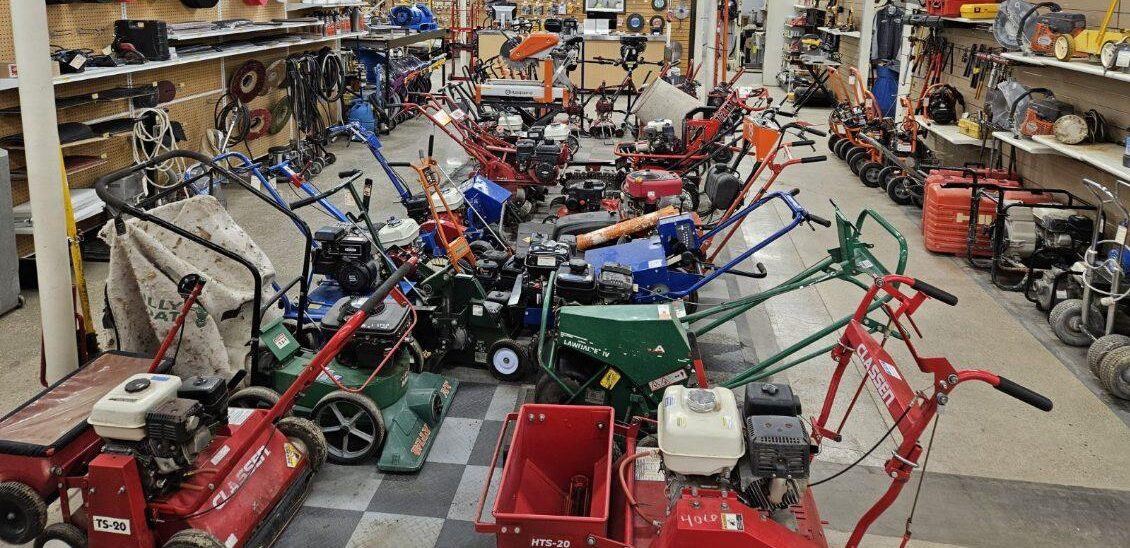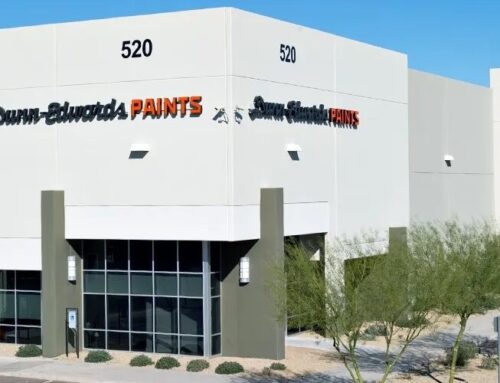In the dynamic landscape of being an independent retailer, staying ahead of the curve means embracing categories—like paint sprayers and accessories—that elevate the customer experience and fulfill customer needs.
Whether you opt for a full department with rentals or just a few linear feet of accessories, the paint sprayer category can expand your reach and build customer loyalty. Learn from two paint retailers who share their best practices for determining the right mix for your operation.
Getting off the Ground
Brian Howenstine, owner of Wabash Hardware and Rental in Wabash, Indiana, opened his store in 1991 and since then, he’s ramped up what his store offers, including adding paint sprayer rentals. He started in the rental business in 1997 after seeing a local need for small equipment rentals.
Howenstine started with a small selection of equipment but rapidly added new options as needed. Paint sprayers were one of the first items he began renting when he opened the rental side of his business.
“Getting started in the rental business is very expensive at first,” he says. “It’s a large capital investment but the returns are great.”
Howenstine says his years of experience with paint sprayers and accessories have led to him sticking with a few select brands after seeing which ones offer longevity and lead to high-quality results.
He currently offers two kinds of sprayers, stationary
and handheld. He chose those two types of paint sprayers as they are the most commonly sought-after kinds.
Howenstine says when he acquires a new paint sprayer, it generally lasts for three to four years, and then he sells each one at a discounted rate.
As the sprayer nears the end of its life, Howenstine will let customers purchase the used paint sprayer.
He advertises sprayer sales mainly through word-of-mouth to previous customers. He says it’s not difficult to sell the sprayers as they are maintained throughout their life at the store.
When renting paint sprayers, Howenstine says selling accessories for the sprayers is a must. From different tips, extension cords and cleaning supplies, Howenstine says being full-service in that category is important because the modern consumer is looking for a one-stop shop and doesn’t want to have to go to multiple stores for everything they need.
Over the years, Howenstine expanded his tip selection for different customer needs, including adding different types of tips for different projects. Many oil-based stains require a specific tip size, while painters need a different tip for latex products that are thicker and heavier in nature. Howenstine says it is important to stock a selection of four to eight tip sizes and spray pattern widths.
DIY customers are the bulk of Howenstine’s rental business but he also serves the professional and
contractor market. He has many homeowners who have been frequent renters. Most of the homeowners who come in to rent sprayers at his Wabash store are flipping houses and need to cover a large area in a short amount of time.
“We have a few contractors who will rent them for large jobs but just as many homeowners who are going into a DIY project will come in,” Howenstine says.
“I believe the growth in this aspect of my business has come from having what people want throughout the years,” Howenstine says. “A hardware or paint store is the natural fit for a rental business. It capitalizes on your demographic and you’re catching all the people who come through your door.”
Howenstine has spoken with other owners in the industry at trade shows and other networking events, and he says the biggest problem that holds other owners back from offering paint sprayer rentals is the maintenance and cleaning aspect.
“A lot of people shy away from renting paint sprayers because they don’t want to deal with cleaning them,” Howenstine says. “It’s a lot of work to clean these machines, but we charge the customer upfront for that service, and we make sure they’re clean after each rental.”
Educating the customer on how to use the machine before they walk out the door alleviates some of the cleaning problems as well, Howenstine says.
Howenstine employs a maintenance employee who has learned every piece of the machines and knows how to increase the longevity. He shares that knowledge with customers.
“If you’re going to rent a paint sprayer, you need to know how it works,” he says. “You need to use it at least once beforehand so you can mechanically know what can go wrong.”
Choose the Right Accessories
Part of being a business owner is knowing what products are profitable and which aren’t and knowing when to cut those that don’t increase sales. Mt. Prospect Paint in Mt. Prospect, Illinois, previously offered paint sprayers and rentals, but after realizing it wasn’t profitable for the business, the owner of the store removed rentals.
Manager Vicki Ortega has worked at Mt. Prospect Paint for over three years and has seen how the store has pivoted to still offer options for customers coming to them for paint sprayers.
Ortega says although her store doesn’t sell or rent sprayers anymore, they do sell accessories for them—tips, cleaning solutions, extension cords, filters and hoses.
By sticking to accessories for paint sprayers, Ortega can still serve those customers with paint sprayer needs. Although Ortega’s store doesn’t sell the sprayers themselves, they’ve unofficially partnered with other local independent paint supply stores that do sell them to send business to one another when the customer comes in for either a sprayer or accessories.
“Our partnership with these stores is amazing because we don’t have to carry a product that is going to sit at our store and not give us a return on our investment,” Ortega says. “Our partnership makes it better for both of us.”
Ortega says her store works to provide knowledge about the machines, as well as replacement parts and accessories for the sprayers.
“Customers generally come in and already have a sprayer and want to know how to use it,” Ortega says. “That’s where we come in—we educate customers on the machines they buy from other stores.”
Ortega says when customers come into the store, she asks them plenty of questions to be sure the accessory they think they need is the one they actually do need.
“People have learned that if they want a cheaper price, they go to a big-box store,” Ortega says. “But if they want more information on what they’re buying, they come to us. And if they come to us, they know they’re getting the right product from the right people.”
Ortega says big-box stores generally have a higher turnover rate, so their employees don’t always have the special knowledge of every product in their store. That’s where she can differentiate her store.
“Many big-box store employees are taught to sell products with their ‘point of purchase’ tags as a way to educate the customer, but those cards don’t always tell the full truth,” Ortega says. “If it’s written down, it’s not always right. You have to know the finer points.”






